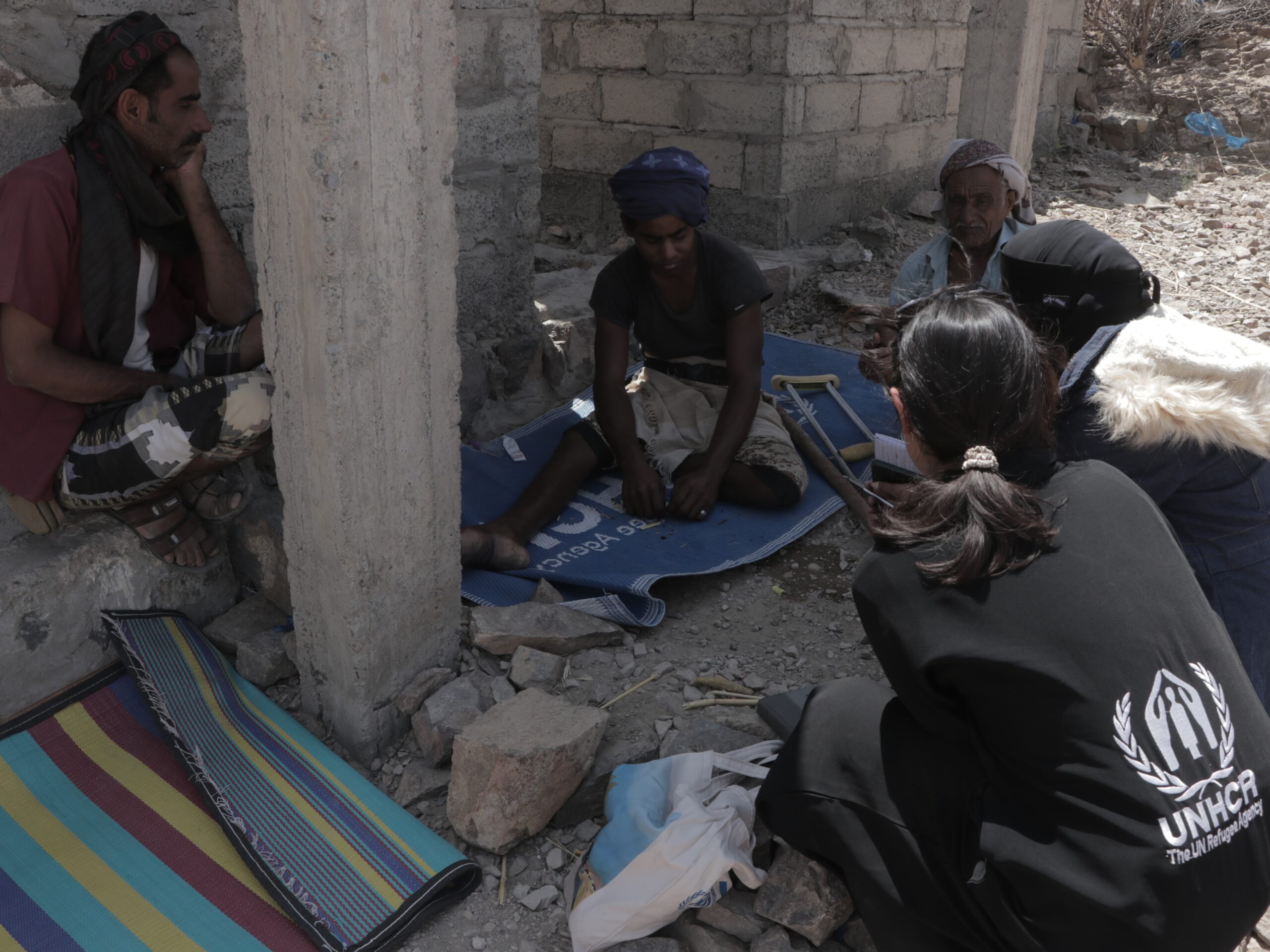Contributions from Sweden have enabled UNHCR to continue providing life-saving support and protection to people displaced in Yemen.
The conflict in Yemen has now been ongoing for more than nine years, with the humanitarian emergency lasting for more than eight years.
The long-lasting nature of the conflict has led to a collapse in nearly all sectors of life, from the economy to the healthcare system, and from food access to other societal services. As a result, more than two thirds of the population of Yemen rely on humanitarian support to survive. People have lost their livelihoods and ability to support their families. Critical infrastructure such as water and sanitation have been destroyed. With only 50% of health facilities and 65% of schools in function countrywide, access to healthcare and education is limited.
The situation is particularly dire for 4.5 million people, who have been internally displaced in Yemen, the majority women and children. Many have been displaced multiple times, have lost homes, loved-ones and social safety nets – and are left extremely vulnerable to all kinds of threats, and in much need of protection, shelter, healthcare and psychosocial support. Despite their hardships, Yemeni communities shelter some 71,000 refugees and asylum seekers from other war-torn countries.
According to UN estimates, more than 21.6 million people will require humanitarian assistance during 2023. Yemen remains one of the world’s worst humanitarian crises and has been for several years.
Despite the massive needs, UNHCR’s operation in the Yemen, is chronically underfunded. Only 29% of the necessary funding for Yemen has been received as of April 2023.
Throughout the conflict, Sweden has stood at the forefront of helping the people of Yemen through steadfast contributions to UNHCR, including both vital unearmarked funding, allowing UNHCR to respond in underfunded and overlooked crises, as well as via dedicated contributions. In 2022, Sweden donated USD 2.1 million to UNHCR operations in Yemen, which has ensured that UNHCR could continue to deliver life-saving assistance and protection to the many in need in Yemen. Last year, Sweden also resettled 53 extremely vulnerable refugees out of Yemen – an important gesture of responsibility sharing for people from other strife-torn countries who have sought asylum in Yemen.
In addition, in February this year, Sweden co-hosted a high-level pledging event for the humanitarian crisis in Yemen, helping to create awareness and mobilize international support. More than USD 1.2 billion was raised for the response in Yemen, with Sweden alone pledging more than USD 25 million at the conference.
“The commitment by Sweden over the years, and especially now when the people in Yemen need it most, has been vital to making a difference through their humanitarian action and political efforts to bring an end to the conflict,” says Maya Ameratunga, UNHCR Representative to Yemen. “Sweden’s assistance has provided crucial relief and hope for a dignified future to those desperately struggling to survive in Yemen.”

More than 382,000 internally displaced persons in Yemen received basic emergency aid in 2022 thanks to UNHCR efforts. This includes blankets, sleeping mats, soap, buckets, mosquito nets, and kitchen sets – items that are necessary to live a dignified life.

Over 34,000 internally displaced persons and returnees received psychological first aid and psychosocial support from UNHCR during 2022, including almost 12,000 children. In a protracted conflict such as in Yemen, many civilians have experienced traumatic events and need psychological help to cope with this.

More than 406,000 internally displaced people and refugees, hosted in Yemen, have received multipurpose cash assistance to support their most urgent needs. Cash assistance helps ensure that the most vulnerable forcibly displaced can access societal services and support their own livelihoods.

More than 31,000 displaced families were provided with emergency or transitional shelters during 2022. As many houses have been destroyed during the conflict, providing shelter to people forced to flee has been a key priority, and UNHCR is also repairing houses, maintaining shelters and exploring sustainable shelter solutions for those in need.

As part of a UNHCR initiative to strengthen protection of the internally displaced population in Yemen, more than 11,000 national ID cards have been issued in 2022 to internally displaced Yemenis by the Yemeni Civil Registry Authority. Having access to the appropriate documentation is vital for people forced to flee in accessing rights and services.

More than 86,000 people in Yemen were reached by UNHCR’s winterization efforts and provided additional aid such as thermal blankets and winter clothing. Winters in many areas of Yemen are much colder than in the surrounding countries due to the altitude, and internally displaced persons may not have access to properly insulated shelters or thermal blankets.
Sweden as a donor to UNHCR:
Sweden is the third largest government donor to UNHCR’s operation in Yemen in 2023, contributing USD 3.84 million, of which USD 1.94 million came from SIDA. Furthermore, as the largest donor of multi-year unearmarked funding to UNHCR, Sweden provided USD 99.3 million in unearmarked funding in 2022, and a further USD 69 million in 2023. This has allowed UNHCR to scale up operations in protracted crises like Yemen and to continue delivering lifesaving aid to vulnerable internally displaced people and refugees.
Share on Facebook Share on Twitter